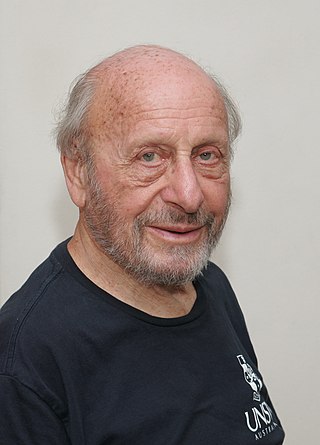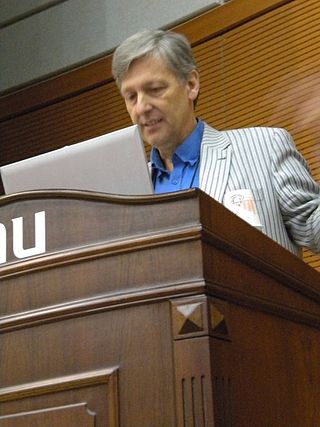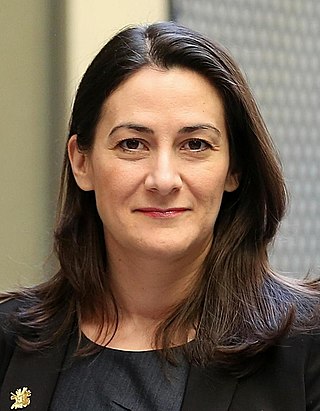Related Research Articles

Post-Keynesian economics is a school of economic thought with its origins in The General Theory of John Maynard Keynes, with subsequent development influenced to a large degree by Michał Kalecki, Joan Robinson, Nicholas Kaldor, Sidney Weintraub, Paul Davidson, Piero Sraffa and Jan Kregel. Historian Robert Skidelsky argues that the post-Keynesian school has remained closest to the spirit of Keynes' original work. It is a heterodox approach to economics.

Heterodox economics is any economic thought or theory that contrasts with orthodox schools of economic thought, or that may be beyond neoclassical economics. These include institutional, evolutionary, feminist, social, post-Keynesian, ecological, Austrian, complexity, Marxian, socialist, and anarchist economics.
Mainstream economics is the body of knowledge, theories, and models of economics, as taught by universities worldwide, that are generally accepted by economists as a basis for discussion. Also known as orthodox economics, it can be contrasted to heterodox economics, which encompasses various schools or approaches that are only accepted by a minority of economists.
Sidney Weintraub was an American economist, one of the most prominent American members of the Post Keynesian economics school. He was the co-founder and co-editor of The Journal of Post Keynesian Economics (1978). His views included criticism of monetarism and the neoclassical synthesis, and promotion of the tax-based incomes policy (TIP).

New classical macroeconomics, sometimes simply called new classical economics, is a school of thought in macroeconomics that builds its analysis entirely on a neoclassical framework. Specifically, it emphasizes the importance of rigorous foundations based on microeconomics, especially rational expectations.

Paul Davidson is an American macroeconomist who has been one of the leading spokesmen of the American branch of the post-Keynesian school in economics. He is a prolific writer and has actively intervened in important debates on economic policy from a position critical of mainstream economics.
Warren Joseph Samuels was an American economist and historian of economic thought. He received a BBA from University of Miami, Miami, FL and obtained his Ph.D. from University of Wisconsin–Madison. After holding academic posts in the University of Missouri, Georgia State University, Atlanta, and University of Miami, he was appointed Professor of Economics in Michigan State University in 1968, where he stayed until his retirement in 1998.
Steven Pressman is an American economist. He is a former Professor of Economics and Finance at Monmouth University in West Long Branch, New Jersey. He has taught at the University of New Hampshire and Trinity College in Hartford, Connecticut.

The Keynesian Revolution was a fundamental reworking of economic theory concerning the factors determining employment levels in the overall economy. The revolution was set against the then orthodox economic framework, namely neoclassical economics.
Athanasios "Tom" Asimakopulos was a Canadian economist, who was the "William Dow Professor of Political Economy" in the Department of Economics, McGill University, Montreal, Quebec, Canada. His monograph, Keynes's General Theory and Accumulation, reviews important areas of Keynes's General Theory and the theories of accumulation of two of his most distinguished followers, Roy Harrod and Joan Robinson.
Basil John Moore was a Canadian post-Keynesian economist, best known for developing and promoting endogenous money theory, particularly the proposition that the money supply curve is horizontal, rather than upward sloping, a proposition known as horizontalism. He was the most vocal proponent of this theory, and is considered a central figure in post Keynesian economics

Geoffrey Colin Harcourt was an Australian academic economist and leading member of the post-Keynesian school. He studied at the University of Melbourne and then at King's College, Cambridge.

Murray Milgate, is an Australian-born academic economist and Sometime Fellow and director of studies in economics at Queens' College in the University of Cambridge, where he is now a Life Fellow. He is the co-creator and co-editor of the celebrated original edition of The New Palgrave Dictionary of Economics (1987) together with John Eatwell and Peter Newman.
Roger Edward Backhouse, is a British economist, economic historian and academic. Since 1996, he has been Professor of the History and Philosophy of Economics at the University of Birmingham.
Robert Wayne Clower was an American economist. He is credited with having largely created the field of stock-flow analysis in economics and with seminal works on the microfoundations of monetary theory and macroeconomics.

Marc Lavoie is a Canadian professor in economics at the University of Ottawa and a former Olympic fencing athlete.
Victoria Chick was a Post Keynesian economist known for her essays on monetary theory, banking and methodology. Her writing on Keynes's General Theory made her one of the foremost interpreters of his work. After the 2008 banking crisis she coined a corollary to Gresham's Law, arguing that in orthodox economics "bad theory drives out good."

Larry Randall Wray is a professor of Economics at Bard College and Senior Scholar at the Levy Economics Institute. Previously, he was a professor at the University of Missouri–Kansas City in Kansas City, Missouri, USA, whose faculty he joined in August 1999, and a professor at the University of Denver, where he served from 1987 to 1999. He has served as a visiting professor at the University of Rome, Italy, the University of Paris, France, and the UNAM, in Mexico City. From 1994 to 1995 he was a Fulbright Scholar at the University of Bologna. From 2015 he is a Visiting professor at the University of Bergamo.

Pavlina R. Tcherneva is an American economist, of Bulgarian descent, working as associate professor of economics at Bard College. She is also a research associate at the Levy Economics Institute and expert at the Institute for New Economic Thinking.
Mark Gerard Hayes, pen-name M. G. Hayes, was a British-Irish economist and former banker. As an economist, he wrote mainly on the economics of John Maynard Keynes and on the economic implications of Catholic social thought. He was a Quondam Fellow in Economics of Robinson College, Cambridge, and published two books on the economics of Keynes and several scholarly articles and chapters on both his areas of research. From 2006-2016 he was the Secretary of the Post-Keynesian Economics Society.